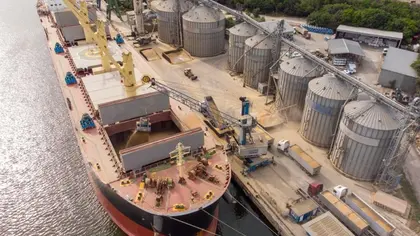The European Parliament’s trade committee rejected all of the amendments backed by farming groups on the proposal to suspend import duties and quotas on agricultural products from Ukraine, paving the way for a swift adoption of the decision at the EU level.
The sharp increase in imports of food commodities from Ukraine into the EU has been a controversial issue for months, and one of the main drivers of the farmers’ protests in Eastern European countries. The proposal to extend the suspension of duties of tariffs has been pushed back on by farming groups, who have requested more extensive safeguards.
JOIN US ON TELEGRAM
Follow our coverage of the war on the @Kyivpost_official.
However, the trade committee voted on Thursday (7 March) to reject all amendments to this effect, approving the unaltered text with 26 votes in favour, 10 against and one abstention.
“The extension of the EU’s trade measures will ensure Ukraine can continue to export its agricultural products to the EU” while providing “solid safeguards” for the EU farmers to be not “overwhelmed by a sudden surge of imports”, the Latvian MEP and rapporteur Sandra Kalniete (EPP) said.
If the Parliament’s plenary next week gives the green light to the text with no amendments, the Council – which also did not propose changes – will only have to formally approve the regulation, to allow it to enter into force after being published in the EU Official Journal.

Christmas in the Forests With Those Who Fought Hitler and Stalin
Controversial measures
The influx of Ukrainian agricultural products has been at the core of farmers’ protests, which have seen tensions at the border between Poland and Ukraine, and between Poland and other EU member states, such as Lithuania.
It has also fueled discontent in other countries such as France.
On 31 January, to support Ukraine in its war effort, the European Commission proposed to prolong the suspension of duties and tariffs on Ukrainian imports until June 2025.
The regulation reinforced the normal safeguard measures in case of excessive food influx and proposed an automatic restoration of duties in case the incoming volumes of poultry, eggs, and sugar surpassed the 2022-23 average.
Following the farmers’ demands, MEPs tabled amendments in the agriculture and trade committees, proposing the extension of the sectors covered by the safeguard measures and an emergency threshold that also took into account pre-war import volumes.
Split reactions
“There is no excuse for so blatantly ignoring the concerns of the farming community,” six farmers and food producers organisations said, following the vote, calling for amendments to be tabled in the plenary.
“It won’t be acceptable that there aren’t any final amendments to the proposal,” farmers organisations Copa and Cogeca, the poultry processors and traders in the EU, the sugar manufacturers, the maize producers, the beet growers, and the union of wholesalers of eggs poultry and game stated.
However, Ukraine’s Minister for Economic Development, Trade and Agriculture Taras Kachka told Euractiv struck a different tone.
“I’m really satisfied not only with the result [of the vote] but also with how it was achieved,” he said, adding that the country’s biggest fear was that the debate would become dangerously politicised, ignoring actual policy and the challenge of combining all stakeholder interests.
[Edited by Nathalie Weatherald]
You can also highlight the text and press Ctrl + Enter






